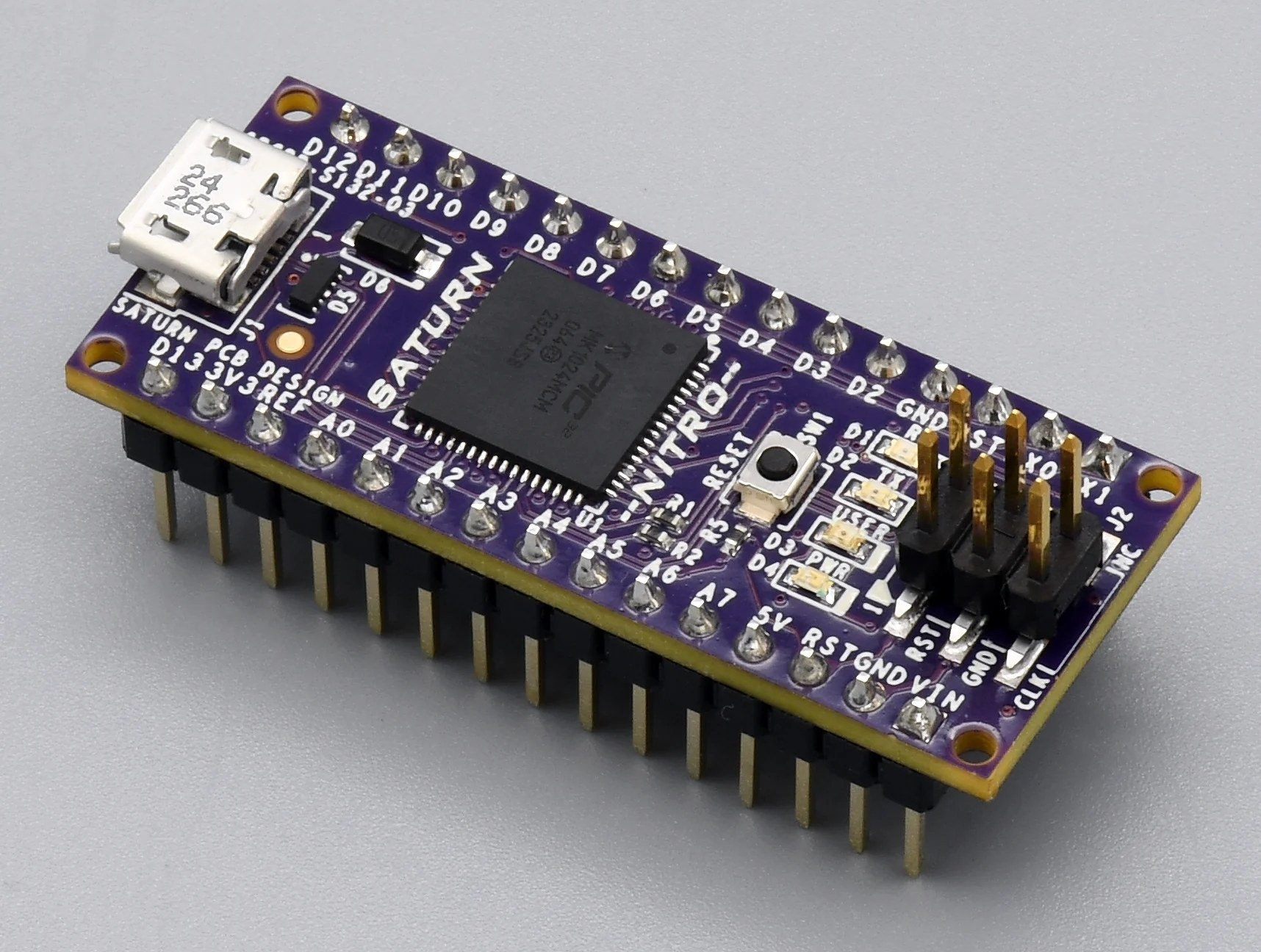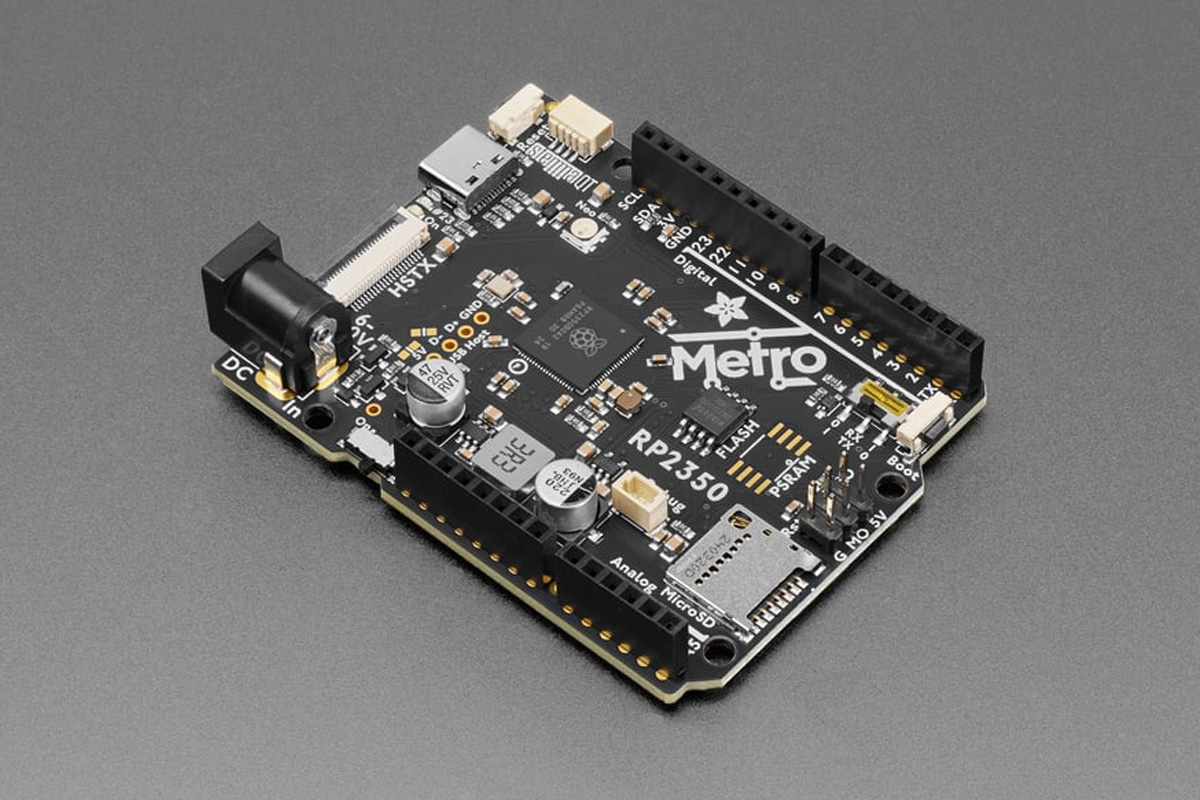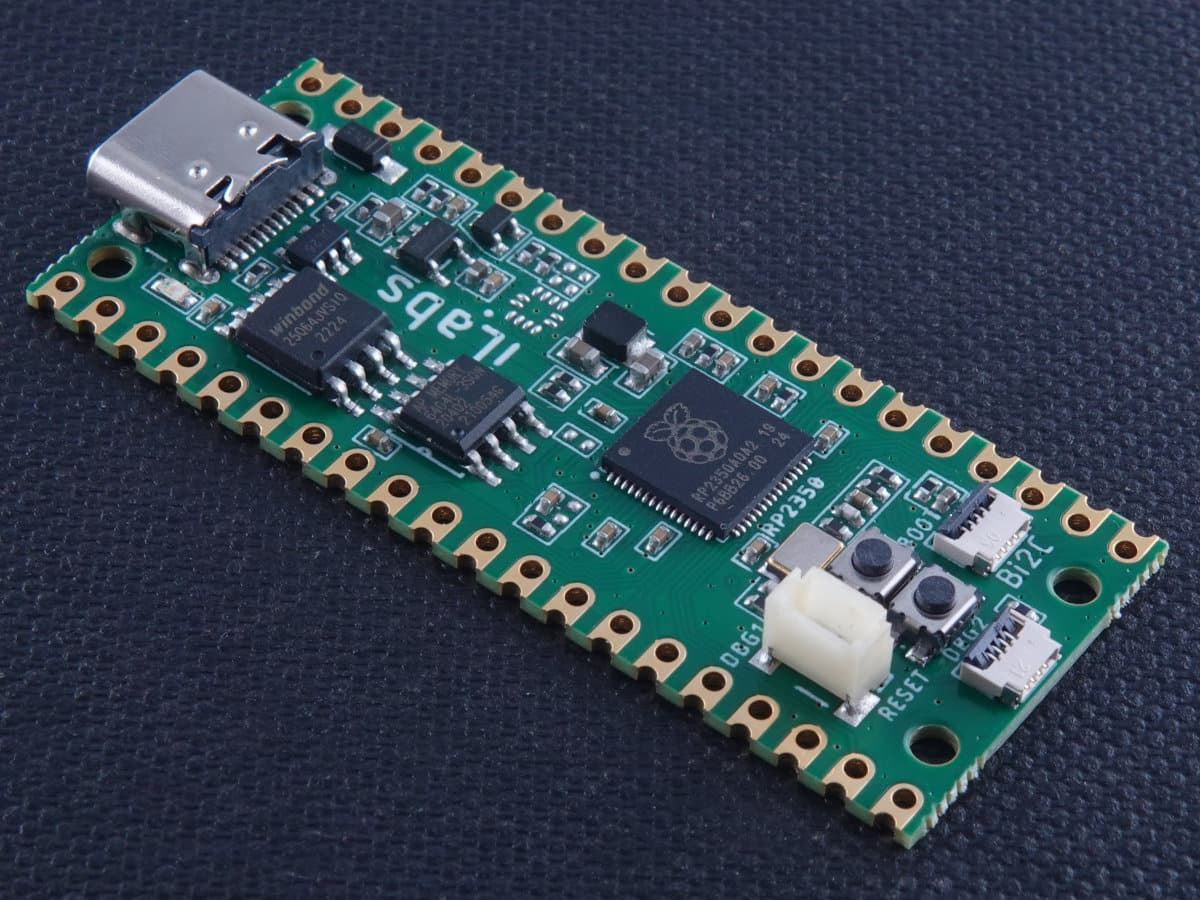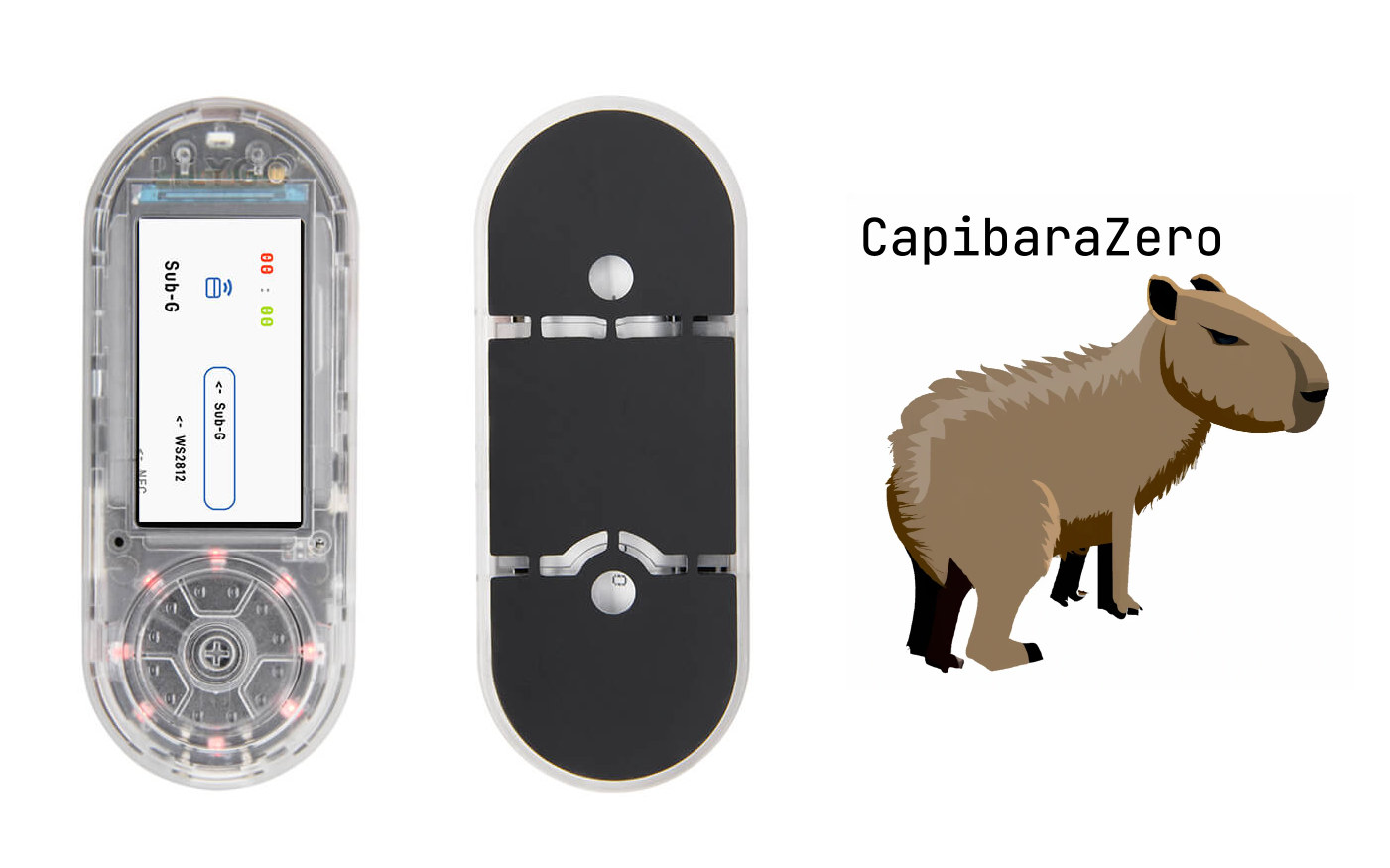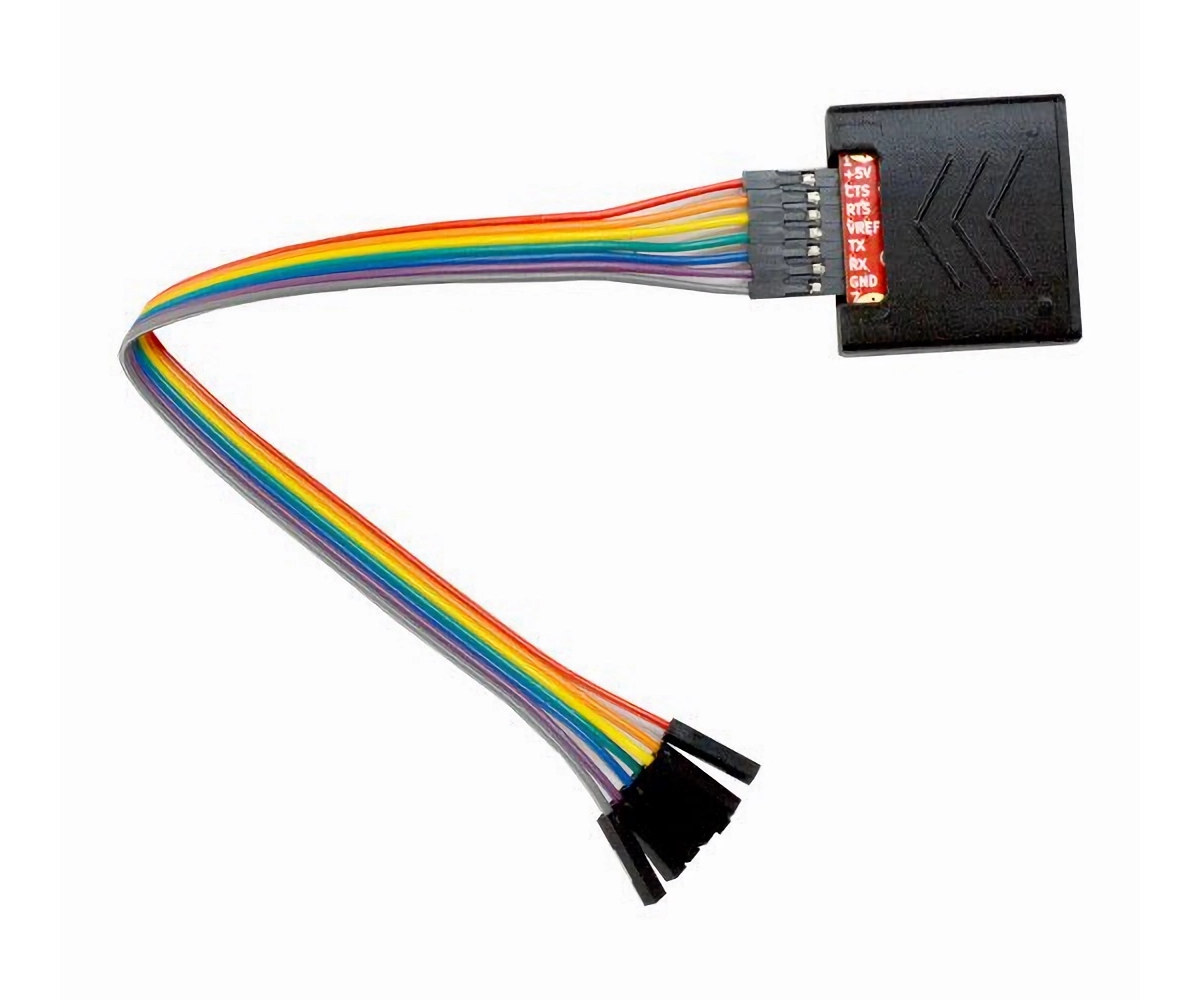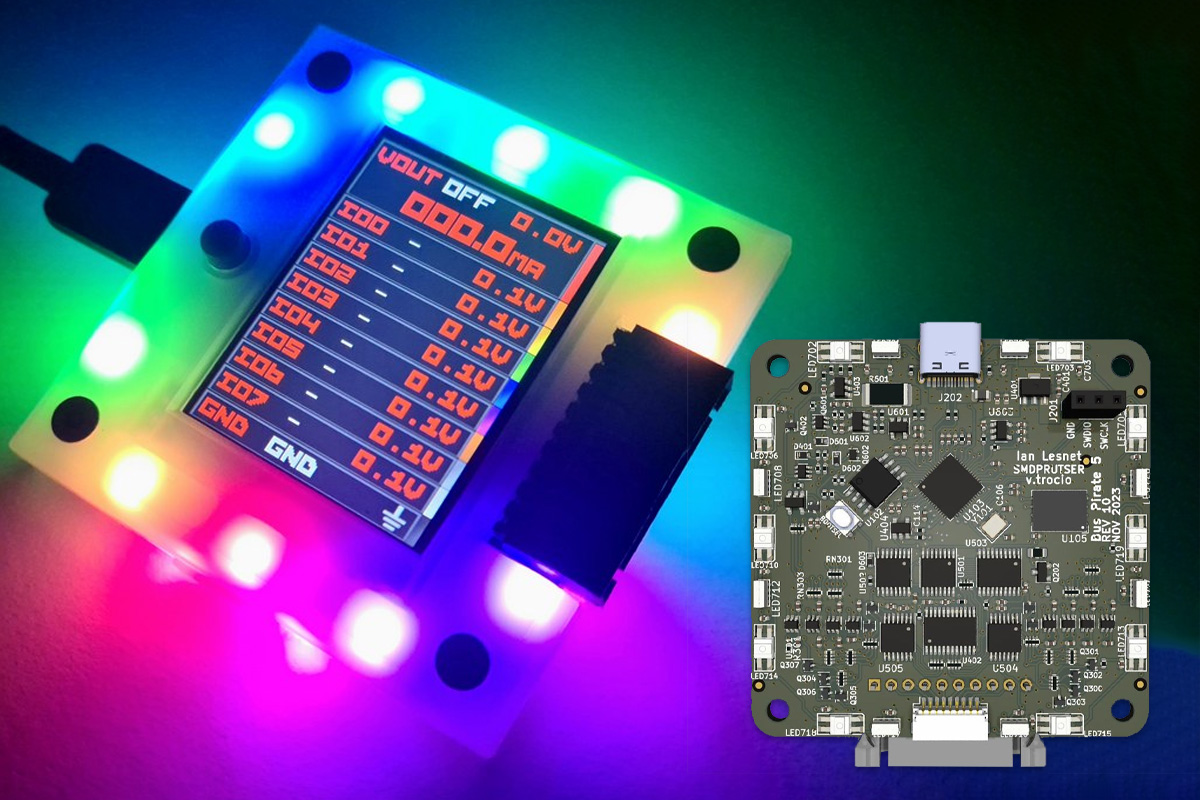While Microchip regularly releases PIC32 microcontrollers and evaluation kits, we don’t see that many PIC32 development boards from third parties. The SATURN NITRO is an exception, and the Arduino Nano-inspired development board is equipped with a 120 MHz PIC32MK general-purpose and motor control 32-bit MIPS microcontroller with 256KB SRAM, 1024KB flash, and 4KB EEPROM. The board closely follows the design of the official Arduino Nano board and can be seen as a beefed-up version with a much more powerful microcontroller delivering 198 DMIPS compared to the Microchip ATmega328P 8-bit microcontroller @ 16 MHz with just 2KB SRAM, 32 KB flash, and 1KB EEPROM, and a less capable I/Os. SATURN NITRO specifications: MCU – Microchip PIC32MK1024MCM064 Core – MIPS32 microAptiv MCU core @ 120 MHz with FPU; up to 198 DMIPS Memory – 256 KB SRAM Storage – 1MB flash, 4KB EEPROM USB – 1x Micro USB OTG port also used […]
Adafruit Metro RP2350 development board follows Arduino UNO form factor, features HSTX DVI output
The Adafruit Metro RP2350 is a Raspberry Pi RP2350 development board that closely follows the Arduino UNO form factor for compatibility with existing Arduino shields. Key features include 37 GPIOs, a microSD card slot, a 5V buck converter (6–17V input), an onboard RGB NeoPixel, a Stemma QT port for I2C peripherals, a 22-pin HSTX port for DVI video output, and a USB Type-C port for power and data. It also provides a Pico Probe debug port, an RX/TX switch for UART flexibility, and a UF2 bootloader for easy firmware updates. Target applications include IoT projects, embedded system development, hardware prototyping, and educational purposes. Adafruit Metro RP2350 specifications SoC – Raspberry Pi RP2350 CPU Dual-core Arm Cortex-M33 @ 150 MHz with Arm Trust zone, Secure boot Dual-core RISC-V Hazard3 @ 150 MHz Up to two cores can be used at any given time Memory – 520 KB on-chip SRAM Security 8KB of […]
CPico RP2350 is another Raspberry Pi Pico 2 alternative with USB-C, 8MB flash, 2MB PSRAM, BConnect I2C & debug ports
iLabs CPico RP2350 is a Raspberry Pi Pico 2 alternative with the same form factor, still based on the Raspberry Pi RP2350 microcontroller but equipped with a USB-C port, 8MB flash, 2MB PSRAM, a Reset button, and Bconnect I2C and debug ports. Apart from that, the CPico RP2350 retains the other features of the Raspberry Pi Pico 2 including the two 20-pin PGIO headers, and BOOT button. It joins other Raspberry Pi Pico 2 alternatives like the Waveshare RP2350-Plus adding battery support. CPico RP2350 specifications: SoC – Raspberry Pi RP2350 CPU Dual-core Arm Cortex-M33 @ 150 MHz with Arm Trustzone, Secure boot Dual-core RISC-V Hazard3 @ 150 MHz Up two cores can be used at any given time Memory – 520 KB on-chip SRAM Security 8KB of anti-fuse OTP for key storage Secure boot (Arm only) SHA-256 acceleration Hardware TRNG Fast glitch detectors Package – QFN-60 Memory – 2 MP […]
USB-C and Lightning tester features an LCD display showing the voltage of each pin
VBEST’s Tail Insert Detector is a USB-C and Lightning cable/device tester that reports “real-time” current and voltage of each pin on its built-in display for easy debugging and testing. VBEST Tail Insert Detector highlights and specifications: Port compatibility – USB Type-C male and Lightning male ports Display – Color LCD display Features – Real-time current and voltage detection Misc – Push switch for power and display mode Power 5V via USB-C female port (on the side) Built-in battery Dimensions – 52 x 35 (estimated) x 14mm Sadly, there’s not much in the way of documentation, so it’s unclear how many display modes there are. I’m also confused by the “real-time” voltage and current reporting, because we’re also told it takes 5 seconds to detect “abnormal pins”. The VBEST’s device is very similar to the A2C caberQU and C2C caberQU boards used to respectively test USB-A to USB-C and USB-C to […]
CapibaraZero firmware enables low-cost Flipper Zero alternatives based on ESP32-S3 hardware
CapibaraZero open-source firmware aims to offer a low-cost alternative to Flipper Zero for ESP32-S3-based hardware platforms and soon other gizmos with ESP32 wireless microcontrollers, notably the LilyGO T-Embed CC1101, similar to the original T-Embed with ESP32-S3 WiSoC, but also featuring a Texas Instruments CC1101 Sub-GHz microcontroller and an NXP PN532 NFC/RFID module. The Flipper Zero is a popular portable multi-tool for pentesters and hardware hackers based on STMicro STM32WB55 Bluetooth 5 LE & 802.15.4 wireless microcontroller and a TI CC1101 Sub-Ghz MCU that got involved in controversies such as a ban proposal in Canada last year due to its (dubious) potential use for car theft. Since then we’ve seen several alternatives such as Monstatek M1 (that’s yet to be delivered to backers…) and HackBat open-source hardware with Raspberry Pi RP2040, ESP8266 WiFi module, and the CC1101 RF transceiver. The CapibaraZero firmware offers another way to create your own cheap Flipper […]
Olimex USB-SERIAL-L is a USB-to-serial debug board with CTS/RTS pins, up to 3Mbps baud rate, adjustable voltage from 0.65V to 5.5V
There are already many USB-to-TLL debug boards on the market, but Olimex USB-SERIAL-L open-source hardware USB-to-serial board is more advanced than most with not only Tx/Rx pins, but also CTS/RTS pins, support for up to 3 Mbps speeds, and an adjustable voltage from 0.65V to 5.5V to cater to a wide range of boards. Olimex USB-SERIAL-L specifications: USB-to-serial chip – Silicon Labs CP2102N Seven signal lines – +5V, GND, CTS, RTS, TX, RX, Vref Baud rate from 50bps up to 3Mbps Output buffers with adjustable levels from 0.65 up to 5.5V USB – USB Type-C port for power and connect to host Misc – Power, Tx, and Rx status LEDs Power Supply Input – 5V via USB-C port Output – +5V to the target Dimensions – 35 x 35 x 8 mm (Custom 3D printed plastic box) Seven 200 mm long cables The Vref signal is used to adjust the […]
Waveshare RP2350-GEEK USB development board doubles as a debugger for Raspberry Pi and other Arm boards
Waveshare has recently launched the RP2350-GEEK USB development board which can also be used as a debugger for Raspberry Pi boards and other Arm-based targets. Built around the Raspberry Pi RP2350 MCU this development board/debugger features a 1.14-inch 65K color IPS LCD, a USB Type-A interface, a microSD card slot supporting SDIO and SPI communication, 16MB NOR-Flash, and multiple interfaces, including 3-pin SWD, USB to UART, and I2C ports. The board is compatible with standard CMSIS-DAP debugging tools like OpenOCD, which attaches to Raspberry Pi’s 3-pin debug connector for debugging. It also features open-source firmware for easy upgrades. Housed in a plastic case, the development board looks like a USB drive and is suitable for debugging, testing, and firmware development in IoT, embedded systems, and educational projects. Waveshare RP2350-GEEK Raspberry Pi debugger specifications Microcontroller – Raspberry Pi RP2350A MCU CPU – Dual-core Arm Cortex-M33 processor @ 150MHz Memory – 520KB internal RAM […]
Bus Pirate 5XL and 6 hardware debugging tools utilize Raspberry Pi RP2350A and RP2350B microcontrollers
The Bus Pirate 5XL and 6 are open-source hardware debugging tools respectively based on Raspberry Pi RP2350A and RP2350B and designed to simplify interaction with various bus protocols like 1-Wire, I2C, SPI, UART, several LEDs, and more. The idea is to send commands to a chip or sensor and get the response, without writing a single line of code making it ideal for hardware hacking and tinkering. The devices feature buffered I/O pins with voltage and current measurement, a programmable power supply with current limiting, an RGB LCD for pin status and info, and an auxiliary header for connecting logic analyzers. All these features make this device useful for applications like debugging circuits, prototyping projects, and reverse engineering devices. The new devices are updates to the Bus Pirate 5 based on Raspberry Pi RP2040 MCU. You’ll find Bus Pirate specifications for the three models in the table below. The original […]


